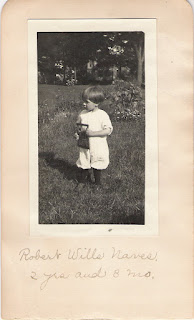Robert Wills Naves (1916-1944) was the grandson of William Henry Wills (1869- 1943) making him a second cousin to all grandchildren of John Albert Wills and Elizabeth Bissonnette. Robert Wills Naves was born in New Hampshire and lived most of his life in that state. Somehow a little famfily photo album got passed to my mother who carefully wrote across the album "papa's brother's family". Here are some of those photos. Robert Wills Naves is the little boy.
 |
| Father and Mother of Robert Wills Naves |
 |
| Robert with his Uncle Fred, probably at Hampton Beach, NH. |
 |
| Robert Wills Naves as an infant |
This little boy grew up to be an artist who volunteered in the United States Army Air Force during World War II, serving with Merrill's Marauders in Indochina and dying there in an accident.
Here is some information about his career as an artist who painted murals and theater screens throughout New England in small town theaters. The following paragraphs are from the Randolph Vt Herald Newspaper a few years ago:
Robert Naves: A professional artist who was employed by several scenic studios in New Hampshire including Crystal Art Studio, Wood Studio, and Monadnock Studio, Robert Naves traveled throughout Vermont and New Hampshire. His specialty was painting stage curtains for theatres, which he would paint in his studio and then ship to the client.
Theatre curtains by Naves are in Vermont in the town halls of Glover, Putney, Brookfield, Wheelock, Concord and Williamstown
Theatre curtains by Naves are in Vermont in the town halls of Glover, Putney, Brookfield, Wheelock, Concord and Williamstown
When volunteers cleared out Brookfield’s Old Town Hall, among the prizes found were two hand-painted theater curtains in the stage area. Now these treasures will be conserved as part of the Vermont Painted Theater Curtain Project.
Melanie LaRocque and Jill Wheatley of Brookfield are organizing volunteers to assist textile conservator (and new part-time Brookfield resident) Michele Pagan in handling and sewing the curtains at the Pond Village Church April 14-16. If necessary, conservation work on the curtains will continue the following week, April 19-21. If you would like to help with this project, call Melanie LaRocque (276-3322) or Michele Pagan (276-3562).
One of the curtains found in the Town Hall is an ethereal view of the floating bridge; the other is an advertising curtain documenting the emerging relationship between local business sponsors and the arts by the turn of last century. Both of Brookfield’s curtains were painted by Robert Naves, a professional artist and salesman who painted many curtains. In the early 1940s, Naves joined the Flying Tigers (and designed their logo) and went to China, where he died in 1944.
Each Town Hall curtain will cost approximately $3,000 to conserve, and the Brookfield Community Project will use funds raised by the benefit concert last September to contribute $500 per curtain for that effort. The rest of the funding has been raised by the Painted Theater Curtain Project, which is part of the Vermont Museum & Gallery Alliance, and has received $150,000 from the "Save America’s Treasures" grant program towards the cost of preserving Vermont’s 120 curtains.
The curtains, found in town halls, grange halls, theaters and opera houses, were painted between 1880-1930. Their romantic, historical or documentary nature reflects a time when people in even the most rural towns endorsed the concept that entertainment should not only delight but also instruct.
Other sponsors of the Painted Theater Curtain Project include the National Endowment for the Arts, the Windham Foundation, the Vermont Community Foundation and the Walter Cerf Fund.
Here are two examples of his theatre curtains:
 |
| Robert lived in this house in New Hampshire The house was called the Leavitt-Garland House History of the Leavitt-Garland House |
Robert W. Naves, married and living in Hampton, NH often worked in a studio in the back of his house. One day in February 1941, while Robert was in the studio the structure caught on fire and Robert suffered severe burns. When he finally recovered from his burns, he volunteered to serve in World War II. While serving in Indochina, he was killed in an accident and buried in Arlington National Cemetery. The town of Hampton honored him by naming a street NAVES ROAD. You can read more about Robert Wills Naves here. While serving, he continued to use his artistic talent ....









No comments:
Post a Comment